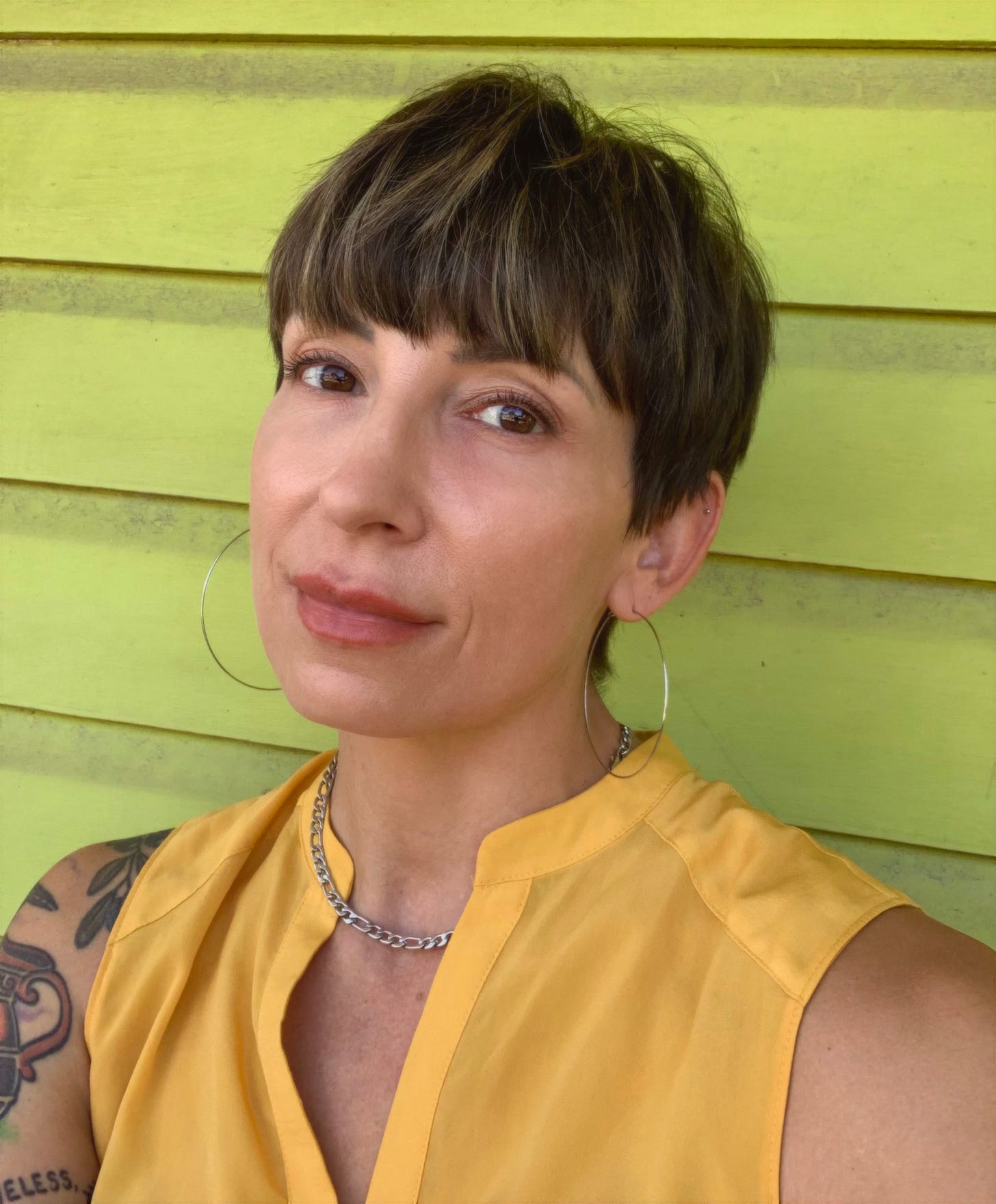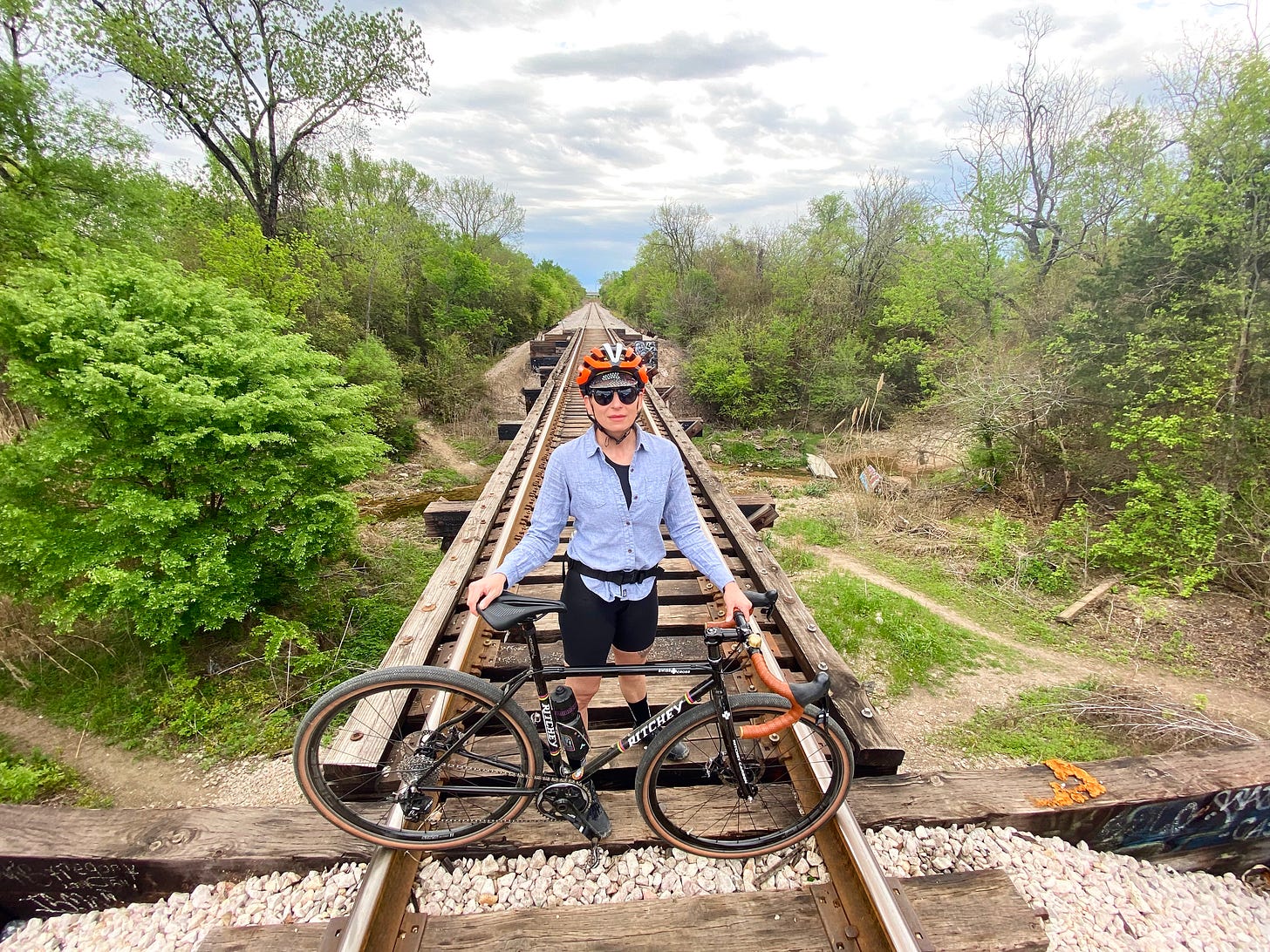After addiction and prison, my neighbor reclaimed her life
Today, Dr. Susie Bannon is a prison abolitionist who's been sober for 12 years
✨ Oh yeah, it’s a new episode!✨
This week on the Cruel Summer Book Club podcast I talk to Dr. Susie Bannon, a teacher, activist, prison abolitionist, and my incredible neighbor! But a big chapter of her life was spent battling alcohol and drug addiction, which ended when she went to prison for almost a year.
When I moved into the back house in our East Side neighborhood for the summer, a beautiful friendship blossomed between Susie and I. Susie (she/they) is a bike riding, weightlifting, nonbinary badass, and I love their vibrant energy, and being greeted by their two dogs every morning. As I got to know her, she shared more of her story with me, which included a distant past of addiction and prison time. After four DWIs and a decade of alcoholism and hard partying, Susie served 11 months in prison. On the podcast we talk about the realities of time served, the silence and long healing arc of families dealing with addiction, and how education saved Susie’s life—and how she now fights to help the formerly incarcerated gain access to an education too.
Now a professor in communications at Texas State University, a prison abolitionist, and sober for 12 years, Susie has come a long way since her year in prison altered the course of her life. Listen to her inspiring story, and know that if you’re struggling with any kind of addiction, change and a brighter future is possible.
Below, read parts of my conversation with Dr. Susie Bannon.
Please don’t forget to:
✨ Subscribe to the podcast on Spotify, Apple Podcasts, or wherever you listen. A new episode comes out every Thursday!
✨ Leave me a five-star review on Apple Podcasts. This really helps new listeners find and subscribe to the podcast.
✨ Share the podcast everywhere!
On growing up with an alcoholic mother
Dr. Susie Bannon [SB]: So my early years were actually spent in the Northeast. I'm from New Jersey originally. And for anyone that deals with some form of substance use, which I have, and ends up within the legal system, I think there is often a history of trauma—undealt with trauma most frequently. And so that is how my early life started out and contributed to, I think, some of the behaviors that I engaged in later.
I do have a history of alcohol and drug dependence. I am sober. I've been sober since 2009. But I got there because I had a lot of shit that I didn't deal with from early on. I grew up in a family where there was an alcoholic parent. Everybody who has experienced that, it's different. But there are also some common themes, right? So a caregiver who is supposed to keep you safe and make you feel loved and taken care of is, in fact, often absent, sometimes abusive. In other words, just not laying a foundation for healthy relationships.
I think my earliest memory of dealing with my mom's alcoholism was probably when I was like four years old. And I say that because I knew I was big enough to be able to know that I needed to be taking care of my little brother, who was a toddler at the time. And I remember thinking to myself, Damn, this baby is heavy! I distinctly recall these incidents where I was thinking to myself, Damn lady, you're supposed to be taking care of me, and you're not here. And so that did affect my development into probably, well, when my mom got sober. There was a seven year-period where I was largely fending for myself and just dealing with really unhealthy circumstances in the household. And that influenced the way I thought about myself, the way I felt in relation to other people. It influenced my coping skills, my ability to—as my therapist would say—self-soothe. I dealt with a lot of emotional response that I didn't know what to do with. And an easy way to deal with that is substance use.
When I was a teenager I started smoking weed, trying acid and all that stuff. And throughout high school, beer and keg parties and stuff, that's all what the cool kids are doing. Once I had alcohol in my system, it was like, Oh, I like this, this is my thing. And very soon after I started drinking, it was apparent that I had a poor reaction to alcohol. All of the things that I remembered as being traumatic about the way that my mother reacted, I was then embodying all of that stuff. Through my 20s—I would say over the next decade—I ended up in situations where I was arrested for public intoxication a few times. I wrecked a car but they couldn't prove that I was driving it because I'd gotten out of it so I got another public intoxication, even though my proclivity for drunk driving was starting to be apparent, and that led to four more incidents where I was arrested. Those were all for drunk driving, so DWIs here in Texas. And ended up on probation for those, and then ultimately in prison and then on parole. And I came home 11 years ago, this October. So that was it in a nutshell.
On spending 11 months in prison
Jillian Anthony [JA]: So who did you encounter [in prison]? What was the experience actually like for you?
SB: So first of all, jail is very loud, and the lights never turn off. So it's a little bit of sensory overload. That said, I was never in a place where there were not at least two or three people who had a vested interest in me being okay. A lot of times we talk about, Well you have to pick sides and join a gang and stuff. That's not how it is, in women's jail at least. And there were actually really nurturing relationships. People watched out for one another. When I was there, I didn't have any supplies, I didn't have any food or hygiene items, or deodorant or anything like that. And people would give me their stuff and just tell me, You can get me when you go to commissary. It was not what you see on TV. I mean, I did see some things that were reminiscent of that, but the people—I was so apprehensive. I was like, God, I'm just gonna have to stick to my own business and just not talk to anyone. And try to not have relationships, because everybody is like, Somebody will do you dirty behind your back, and you don't want to owe anybody anything or have someone lending you things. But people took care of me. And that was both surprising and a huge relief.
JA: To me, that makes sense. I mean, wherever you are, you're going to form community, and you need someone no matter where you are.
SB: Yeah, for sure. It's just interesting how the messages that we receive about certain places convince us otherwise.
JA: Well, we're supposed to think of prisoners as nonhuman people.
SB: Exactly.
JA: When in fact, many people know someone incarcerated or formerly incarcerated. [Editors’ note: Nearly half of all Americans have had a family member in jail or prison.]
On Alcoholics Anonymous, and spending her first year sober in prison
JA: And that year that you were in prison almost a year was also your first year sober, right?
SB: Yes.
JA: So what was that experience? How did you deal with that in prison?
SB: I said the Serenity Prayer constantly. I have anxiety. And so to cope with the sense that I'm going to freak out and I can't leave, I would just say the Serenity Prayer over and over and over again, almost like a mantra. And I slept a lot. I would tie a sock around my eyes so that the sunlight wouldn't get in. And I would just try to sleep as much as possible, and wrote a lot of letters. You're allowed to get magazines in there, and so I had my mom sending me, like, Self magazine, like, I'm going to get ripped! Never happened. But it was nice, because you can't have perfume or anything inside. And women's magazines would have perfume ads. So we'd rip those out and secretly use them so that when our guests came, we smelled nice.
So it was a lot of little attempts at self-care, wherever I could find them. Just one day at a time. Early in recovery, I was definitely more of like a Big Book Thumper than I am now. But the 12-step program works for a lot of people. And it got me sober. And some people keep their relationship with meetings and 12-step stuff, some people move on to do other things. I'm one of the latter. But early on, it was definitely my relationship with my AA family and my sponsors that were out here writing me letters and stuff that kept me going throughout that.
How her time in prison pushed her toward education and activism
SB: Being incarcerated—being within a system that I really didn't know anyone who had been impacted by, didn't know anything about other than what I'd seen on TV and read about in the news and stuff, seeing the race and class dynamics that were at play—was an eye-opening experience. I wish that I was woke to these issues way earlier. But I was a late bloomer. There are issues of systemic racism in every institution in society, but in particular within the criminal justice system, and then issues of class and gender as well—how indigent people are incarcerated, people who don't have families to support them, how they suffer needlessly, without the basic resources that you really need to just survive. I could not not think about that shit when I was in there.
When I found out I made parole, I was so grateful. I was so grateful. I told myself, one, I'm never coming back to this place ever. And two, I'm never going to forget the women that I'm leaving behind here, ever. It shaped the way I view the world. For the rest of my life.
Further resources:
Formerly Incarcerated College Graduates Network (FICGN), which Dr. Bannon cofounded
Dr. Bannon’s Ted Talk
Extra special thanks to the team who helped bring the CSBC podcast to life:
My producer, Dave Kushner (Instagram, Twitter), co-host of the Wrestling with Friends podcast
My editor, Shawn DePasquale (Instagram, Twitter), co-host of The Nanny Podcast
Logo artist Jaymie de los Reyes
Thanks for reading and listening to Cruel Summer Book Club! If you value CSBC, please consider showing your support on Venmo @jillathrilla, or through PayPal.
Thank you so much to readers Alla, Amelia, Andi, Annabel, Anne Marie, Ann-Kathrin, Brenna, Brittany, Brittany, Bryce, Cara, Catherine, Christine, Courtney, Danielle, Edith, Emily, Erin, Esme, Grace, Hannah, Jacki, Julia, Kate, Katie, Katie, Mallory, Maria, Melanie, Molly, Naureen, Rachel, Rahul, Riddhi, Rocky, Samantha, Sarah, Sasha, Scarlett and Stella for your support!
You are not alone!






This was a great interview and for some reason, exactly what I needed this morning (it was the reminder that I can say the Serenity Prayer on repeat if I need to that did it, I think).